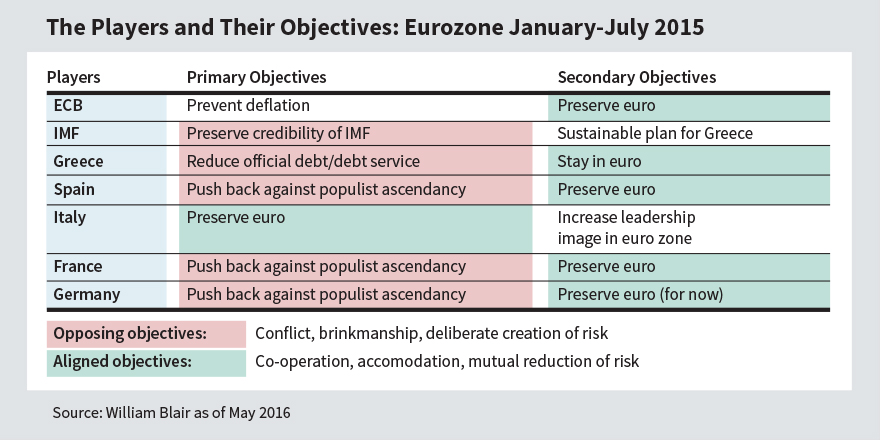While fundamental value—an inexorable tide that pulls on the price of markets and currencies over longer-term time horizons—is still necessary as an investment tool, it’s no longer sufficient.
What we need, in addition, is an understanding of the macro developments that can drive price either toward or away from fundamental value in the short to medium term.
The challenge is that the complexity of macro developments in a global context typically exceeds what the human mind can process. To understand these developments, an analytical paradigm is necessary—and the one we use is game theory.
Game theory is a set of principles for scrutinizing the sequential, strategic interactions of multiple agents—the parties at the bargaining table in the conflict in the Middle East, the U.S. debt-ceiling negotiations, and the eurozone crisis, for example. These parties act in their best interests and respond to other parties’ actions via cooperation and conflict.
Consider the eurozone crisis that has evolved over the past couple of years. Coming into 2015, each of the 17 eurozone countries had individual objectives, some overlapping with other countries’ objectives, as the chart below illustrates. These objectives evolve as the situation progresses and the players’ interests change, because every move undertaken changes the payoff and influences other players’ actions.

The outcomes of these strategic interactions depend on players’ objectives (shaped by individual cultural environments and economic incentives, as shown above), dimensions of net influence (the ability to dominate the others parties based on current conditions), and modes of action (threats as potential punishment for failure to cooperate, promises of potential reward for cooperation, and passivity).
What does this have to do with investing? Game theory provides a way for us to better organize and process the vast amount of information that affects global economies and markets. It provides a context within which we can fill knowledge gaps with independent, seasoned judgment in order to exploit uncertainty.
But I’ll discuss the application of game theory to investing more in a future post, after I go into more detail about dimensions of net influence and modes of action, and walk through an easy-to-understand game theater using our old friends Rocky & Bullwinkle.
Brian Singer is head of dynamic allocation strategies team and portfolio manager at William Blair.